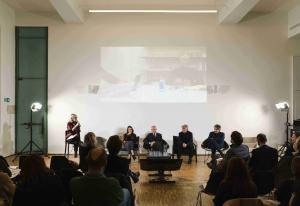
It is critical that construction industry’s general contractors, architects and governments find ways to innovate and incorporate minimum efficient standards and innovations, such as architectural upcycling and recycling, through proper and updated legislative frameworks and rules as well as sustainable public and private finance that clearly consider hydrogeological and environmental risks.
This is one of the conclusions reached by the event “Climate neutrality and the city. From the principles of the San Marino Declaration to the planning commitment for sustainable and inclusive cities” organized by Triennale Milano in cooperation with the United Nations Economic Commission for Europe (UNECE) that was held on 15 December 2022 and gathered urban planners and operators, architects and other relevant stakeholders to reflect upon the relevance of the San Marino Declaration, adopted on the 3 October by the UNECE member States during the 83rd Committee on Urban Development, Housing and Land Management session and, specifically, upon the Principle F stating the priority on climate neutrality, whereby “Cities, urban infrastructure and buildings should be designed and requalified to minimize the associated climate footprint, by adopting creative solutions that reduce pollution and energy use”.
As reminded by Stefano Boeri, President of Triennale Milano, “the Declaration is an appeal, first launched by Lord Norman Forster, to all urban operators and planners, to the world of urban construction, to intellectuals and politicians to achieve altogether a sustainable urban design and architecture, through sustainable housing, land management, forestation and urban development”.
“Cities generate 80% of our wealth and are responsible for 60% of CO2 pollution. They are the clue to combatting climate change. In designing a city, architecture starts with the home, communities and public space. I encourage everybody who touches the environment to sign up to UNECE’s San Marino Declaration and its 11 principles.” stated Lord Norman Foster, President of the Norman Foster Foundation, in his opening speech.
The panellists agreed that the San Marino Declaration is a great step forward, but a bigger and more integrated vision is needed to fully achieve a sustainable environmental, economic, social and cultural urban development.
According to the United Nations Environment Program, the building and construction sector is one of the most polluting sectors, accounting for almost the 40% of worldwide energy and process-related CO2 emissions in 2021.
The importance of a behavioural and cultural change of individuals, but also of companies as well as the relevance of educating young people were also highlighted as key priorities. An integrated, multidisciplinary and forward-looking approach that considers the long-term perspective is needed. Urban planning and regeneration must put people at the centre, and the construction of green and blue infrastructures and the implementation of climate change mitigation and adaptation measures must be considered as priorities.
Giulio De Carli concluded that “All the panellists agreed that it is no longer an option to work on climate neutrality and sustainability in urban development, but it is an urgency and a necessity. The synthesis of the need to work on education on the one hand, and on coercive rules on the other, makes the Declaration and its principles the compass to follow.”
The video recording of the session, in Italian, is available at: https://www.youtube.com/watch?v=KBavTGF895k

